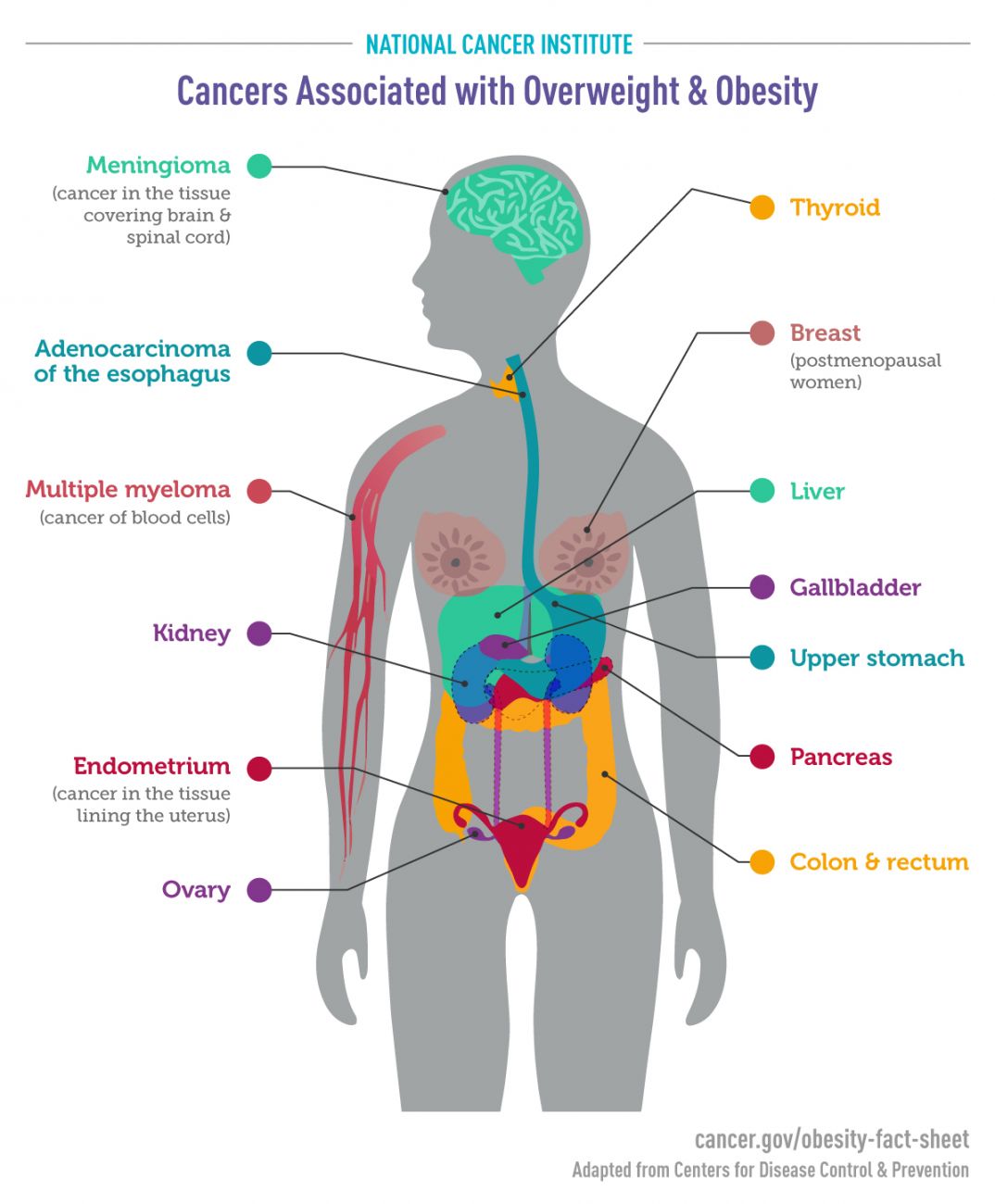For some cancers, young adults now face twice the risk that Baby Boomers did at the same age — and it's due to excess weight.
This is the first in a series of three articles addressing the rising number of cancers caused by excess weight or obesity.
About 40% of all cancers diagnosed in the U.S. are now linked to overweight or obesity — the same percentage associated with tobacco use — and the number is rising as Americans' waistlines expand. The trend is especially alarming because "more than two-thirds of all adults and nearly one-third of all children and youth in the United States are either overweight or obese," according to the U.S. Office of Disease Prevention and Health Promotion.
Research shows that obesity not only increases the risk of getting cancer but also speeds its development and makes it more likely to occur at a younger age, reports Nathan A. Berger, M.D., in the research journal Obesity. Berger says the growing number of cancers in young people is "a matter of urgent concern."
In fact, a landmark study published in The Lancet Public Health in February 2019 warns that the increasing number of overweight or obese young people threatens to undo the progress made in reducing cancer deaths over the past few decades.
Overweight and obesity have been linked to 13 cancers:
Millennials (born between 1981-1996) now have twice the risk that Baby Boomers had at the same age for developing four of those cancers: colorectal, endometrial, pancreatic and gallbladder. Two of those — pancreatic and gallbladder — are typically discovered in the advanced stages, when the prognosis is very poor. And the greater a person's Body Mass Index (BMI), the greater the risk.
Colorectal cancer is also on the rise in patients under 50, and younger patients are more likely than older patients to be diagnosed when the disease is in the advanced stages.
Visit Project Best Life
Project Best Life is a new health and wellness blog aimed to help millennials live a healthy, happy and balanced life.
Learn MoreHow Fat Drives Cancer: Two Theories
How does body fat encourage the growth of cancer? Joyce Ohm, PhD, Department of Cancer Genetics and Genomics at Roswell Park, says there are two main theories, both focusing on visceral fat, "which is the fat that collects around your internal organs."
The first theory is that fat contributes to inflammation — specifically, chronic (long-term) inflammation, which has been linked to cancer. "We don't know exactly why that happens, but we know that it does. This is an active area of research at Roswell Park," says Ohm.
The second theory centers on the fact that "fat cells can produce a variety of hormones, including estrogen, which can disrupt the overall balance of hormones in the body." This may explain why breast cancer and prostate cancer — which are regulated by hormones — are among the cancers most commonly linked to obesity.
"One of the reasons is probably because fat tissue is producing more hormones than the body would normally produce, and that can drive the production of those cancer cells. The cells have already lost their ability to control their own growth, and now you're basically feeding them what they want, which is more hormones."
That may explain why recent studies have shown that, compared with breast cancer patients of normal weight, postmenopausal women who were obese at the time of diagnosis had a 34% higher death rate — and obese premenopausal women had a 75% higher death rate.
Data also reveal that obese men tend to have more aggressive prostate cancers and to have their disease diagnosed in the advanced stages.
The National Cancer Institute (NCI) predicts that if these obesity trends are not reversed, by 2030 the U.S. could be dealing with an additional 500,000 cases of cancer.
Fortunately, even small changes can make a difference: The NCI estimates that 100,000 new cases of cancer would be prevented if every adult reduced his or her body mass index (BMI) by only 1%.
Are You Overweight or Obese?
Surveys show that healthcare providers are often reluctant to talk about weight management with patients who are overweight or obese. That means it's up to you to get the facts you need. Use this Body Mass Index (BMI) calculator to find out whether you're in the danger zone.
Part 2 of this series will look at the serious challenges doctors face in diagnosing and treating cancer patients who are overweight or obese — and the poorer prognosis those patients face compared with patients of normal weight. In Part 3, we'll look at the main factors driving the obesity epidemic and talk about habits you can change to reduce your cancer risk.
Stay tuned to Cancer Talk.



